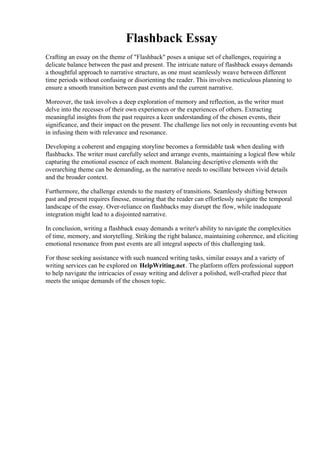A flashback college essay transports the reader to a significant past event that has shaped the writer’s perspective. Concluding the essay effectively serves as a way to tie the experience back to the present and reflect on its impact. Here’s how to craft a powerful conclusion for your flashback college essay:

Reflect on the Main Idea
- Begin by restating the thesis statement of your essay. This reminds the reader of the central point you’ve been arguing.
- Use specific details from the flashback to reinforce your thesis and highlight its significance.
- Explain how the experience has changed your understanding of yourself, others, or the world around you.
Connect to the Present
- Describe how the lessons learned from the flashback have influenced your actions and decisions in the present.
- Draw parallels between the past and present to show how the experience has shaped your growth and development.
- Use figurative language or anecdotes to illustrate the connections you’ve made between your past and present self.
Consider the Future
- Discuss how the retrospective insights gained from the flashback will guide your choices and aspirations in the future.
- State your goals or aspirations and explain how the experience has empowered you to pursue them.
- Express your gratitude for the experience and acknowledge its enduring impact on your life.
Example Outline
Paragraph 1: Reflective Summary
- Restate the thesis statement.
- Highlight key details from the flashback supporting the thesis.
- Share personal realizations gained from the experience.
Paragraph 2: Connections to the Present
- Describe how the lessons learned have affected your present actions.
- Draw parallels between the past and present to illustrate growth.
- Use figurative language to make the connection more vivid.
Paragraph 3: Future Impact
- State future goals or aspirations.
- Explain how the flashback experience has prepared you for these challenges.
- Express gratitude for the experience and acknowledge its lasting significance.
Common Mistakes to Avoid
- Overgeneralizing: Avoid making sweeping statements that do not align with the specific details of your experience.
- Lack of Connection: Ensure a clear connection between the flashback and the lessons learned. Avoid simply restating the flashback without reflecting on its impact.
- Insufficient Reflection: Provide meaningful insights into how the experience has shaped your perspective. Avoid superficial reflections.
- Cliché Language: Use original and specific language to convey your message effectively. Avoid using overused phrases or clichés.
- Weak Ending: End with a strong and memorable statement that leaves a lasting impression. Avoid trailing off or using a weak concluding sentence.
Useful Tables
Table 1: Key Components of a Flashback Essay Conclusion
| Component | Purpose |
|---|---|
| Thesis Restatement | Reminds reader of the central point |
| Reflective Details | Reinforces thesis with specific examples |
| Personal Realizations | Highlights growth and transformation |
| Present Connections | Shows influence on current actions |
| Future Impact | Explains how experience guides future aspirations |
Table 2: Transition Phrases for Connecting Past and Present
| Transition Phrase | Effect |
|---|---|
| In light of this experience… | Shows impact of flashback on current perspective |
| Looking back, I realize… | Highlights lessons learned and their influence on present actions |
| As a result of this journey… | Describes how the experience has transformed the writer’s path |
| This experience has taught me… | States specific lessons learned and their importance in the present |
| Armed with the insights I’ve gained… | Expresses confidence and readiness based on retrospective insights |
Table 3: Questions to Consider When Reflecting on a Flashback Experience
| Question | Purpose |
|---|---|
| What were the most significant events or moments in the flashback? | Identifies key turning points in the experience |
| How did these events shape my understanding of myself and the world? | Highlights the personal growth and transformative nature of the experience |
| What lessons or values did I learn from the experience? | Articulates the specific benefits gained from the retrospective reflection |
| How has this experience influenced my choices and aspirations in the present? | Demonstrates the practical impact of the flashback on the writer’s current life |
| What does the experience tell me about my future aspirations and goals? | Projects the lessons learned into the writer’s future trajectory |
Table 4: Common Clichés to Avoid in Flashback Essay Conclusions
| Cliché | Alternative Phrase |
|---|---|
| “Life is a journey…” | “My journey through this experience has…” |
| “Time flies…” | “The passage of time has revealed…” |
| “I’ve come a long way…” | “Looking back, I recognize the substantial progress I’ve made…” |
| “I’m so grateful for…” | “The enduring gratitude I feel for this experience stems from…” |
| “I’ve learned so much…” | “The countless valuable lessons I’ve gained from this experience include…” |
